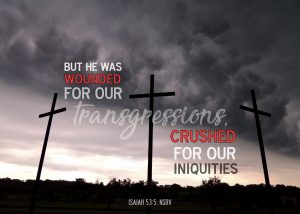
Rev Renewal:
“Going a little farther, he fell with his face to the ground and prayed, “My Father, if it is possible, may this cup be taken from me. Yet not as I will, but as you will” (Matthew 26:39)”
“When they came to the place called the Skull, there they crucified him, along with the criminals – one on his right, the other on his left. Jesus said “Father, forgive them, for they do not know what they are doing.” (Luke 23:33-34a)”
“At the sixth hour darkness came over the whole land until the ninth hour. And at the ninth hour Jesus cried out in a loud voice, “Eloi, Eloi, lama sabachthani?” – which means, “My God, my God, why have you forsaken me?” (Mark 15:33-34)
“When he had received the drink, Jesus said, “It is finished.” With that, he bowed his head and gave up his spirit (John 19:30)”
The events which take place surrounding Jesus’ trial, crucifixion, and death begin in the Garden of Gethsemane. Jesus, aware of what is about to take place, pleads with God to take away that which is about to happen. Yet, Jesus desires not his own will, but God’s will. In this moment, Jesus displays his human concern to what will take place – death – but seeks to stay obedient to God.
There is no letting up the ridicule, shame, and excruciating pain for Jesus all throughout the different events. He is mocked by religious leaders, beaten and spit upon, and even scorned by those watching as he hangs on the cross. Many would question why he is not able to save himself if he was to have had a divine nature to him. In these moments, while Jesus could have displayed his divine nature, instead asks for God to forgive all of them for “they do not know what they are doing”.
As Jesus continued to endure the crucifixion, we hear again, a mix of human and divine natures. In his pain, Jesus cried out asking why God had forsaken him. He could feel the emptiness and darkness surrounding him. However, he then proclaims “It is finished” as he breathed his last breath. What needed to take place on that day had come to completion.
Many have wondered why it is called “Good Friday” when everything about that day is surrounded by darkness, pain, and emptiness. Jesus, a man who had not committed any formal crime is severely beaten and mocked. Jesus then takes on the most horrific type of death at the time – crucifixion. It truly does appear that all hope is now gone for what some were expecting regarding Jesus as a Messiah.
Perhaps, though, that is why it is termed “Good Friday”. For while it was not apparent then, the fullness of Friday’s events would soon come — three days later. This fullness was not that death had won, but that life had won. It is in the painful moments and darkness of death which Jesus endured for us that would lead him to the resurrection and the promise of new life. Every element of our sin, the power of evil, and the gloom of death would be wiped away.
Unfortunately, for us, moments of darkness, despair, pain and struggle are never easy to endure. We want out, we want them to end. Jesus was no different. The “good” about “Good Friday” is not the events themselves, but what they would represent. Jesus now knows the fullest extent of pain, struggle, loss, and darkness. He can be present with us in our darkest moments. He can comfort us in our pain. He also can restore in us a hope that death will not win.
May you experience a sense of God’s “goodness” on Good Friday, knowing the outcome. Though it is never easy in times of uncertainty, may you trust that Christ is with you, for he endured the fullest darkness on that Good Friday. May you also seek the hope and promise that will come to us through the Easter Proclamation.
Good Friday may not have a “good” vibe in the earthly sense, but as the body of Christ, we are aware of God’s full “goodness”.
Blessings,
Pastor Arlyn ><>

